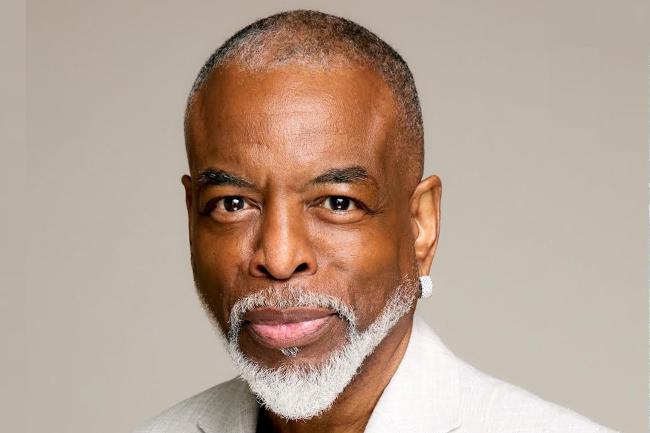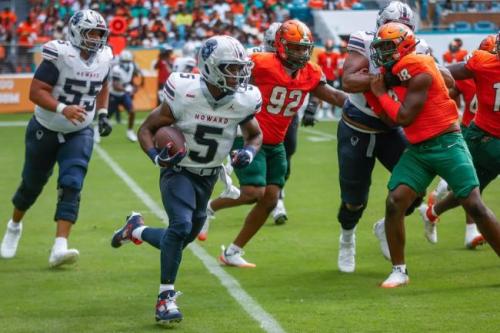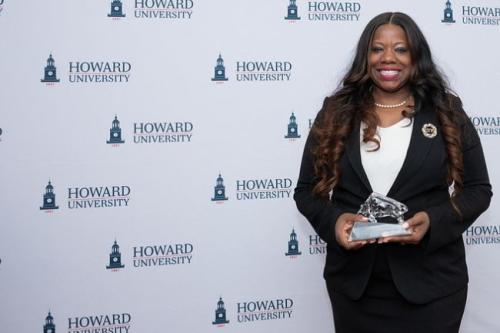LeVar Burton is a literal living representation of history. Through his starring role in “Roots,” set in the past, and “Star Trek: The Next Generation,” set in the future, he has served as the prototype for representation of the Black experience in a manner that has captivated audiences of all backgrounds. At the same time, he has managed to bridge the gap between broadcast television and the written word by hosting and producing the “Reading Rainbow” television show and in the process serve as the catalyst for countless children to love reading and the expansion of imagination and knowledge that comes with it. Quite simply, Burton’s impact on global culture is timeless. However, in his heart, he is a storyteller.
“My commitment is to show up in my authentic self, and spirit takes care of the rest,” Burton said. “I recognize that I have been blessed with the opportunity to portray the Black experience from our enslavement to the stars, and LeVar, the ‘Reading Rainbow’ guy is smack dab in the middle of that continuum. Who gets to do that? I consider one of the blessings of my life is to have this opportunity to represent Black people the way I feel we should be represented in the media and in popular culture. To have grown up and to have become part of the storytelling mythos of this culture and stand for honest, forthright, dignified representation of us in what I believe to be the most powerful tool ever created for changing hearts, minds and social action — the medium of communication — [makes me] feel enormously blessed.”
To say that the 1970s miniseries “Roots” is merely iconic is like saying that the Pacific Ocean is simply a large body of water. Perhaps more than any other television event, “Roots” transformed the discussion of race and slavery in America. It told the story of the ancestors of author Alex Haley, beginning with his ancestor Kunta Kinte. For the first time, Black people saw the triumph and tragedy of America’s original sin depicted in stark relief in front of the world. Others were jolted out of a pollyannish viewpoint and were forced to reckon its vestiges. It was an unprecedented phenomenon. Unlike most miniseries, which peak on their first night, the audience for “Roots” grew as the series progressed. Its final episode was watched by over 100 million people, a little under half of the U.S. population at the time, a record broken only by the series finale of “M*A*S*H.”
Even today and with the help of tools like ancestry.com, many Black people cannot trace their heritage earlier than the late 1800s because records of slaves were poorly kept, many slaves had the same name, and they were bought and sold like chattel. For a large segment of the Black population, watching or reading “Roots” is as close as they will ever get to imagining how their lineage unfolded, and Kunte Kinte will be the visualization of their family’s patriarchy.
Enter LeVar Burton. At just 20 years old, he became the television version of a common ancestor through his portrayal of a young Kinte. His raw, emotionally charged performance was the prism of pride, defiance, and resistance to oppression through which many Black people saw themselves and their families in the 1970s and still do today. Kinte was kidnapped, transported across an ocean, sold, chained, whipped in public, forced to adopt a new name, escaped, was recaptured, and had his foot cut in half. Even so, Burton was able to show the agency that Kinte maintained, the dignity that he demanded, and the respect he commanded. The role earned Burton an outstanding lead actor Emmy Award nomination.
“It was the ‘Roots’ experience that really opened my eyes to the sheer power of the medium of storytelling through motion pictures and sound,” he said. “We used to teach slavery as an economic institution. Post-Roots, it was impossible to even consider slavery without the human cost. It shifted the paradigm about what happened during our period of enslavement.”
“Roots” was enough to make any actor an actor a legend. Fast forward to the 1990s, however, and Burton took on another iconic role. This time, he wasn’t the prototypical African American ancestor, but rather the embodiment of the Black human descendant. As Lt. Commander Geordi La Forge, the chief engineer aboard the U.S.S. Enterprise in the “Star Trek: The Next Generation” television series and movies, he modeled for the world the enduring spirit of Black intellect, ingenuity, grit, adaptability, and humanity. But for many, his role was important for a simpler reason — it was proof, albeit fictional, that Black people made it into the future.
The Star Trek universe, created by the legendary Gene Roddenberry, was designed to be a kind of utopia, where humanity had learned the important lessons from its past challenges and became an interplanetary society where money, war, and discrimination were relics of a past era. Yet even in the future Burton found that there were challenges in ensuring that people of color were properly represented. In particular, Burton was concerned that the La Forge character might be pigeonholed as a nerd who was uncomfortable engaging in relationships. Burton didn’t want La Forge, as a Black man, to be seen as an outsider or an “other.” As Burton reprised the character in 2023 for the third season of “Picard,” he worked with the producers and writers to ensure that LaForge’s family was portrayed positively and that his role as a father was centrally highlighted. In fact, Burton’s real-life daughter Mica Burton played La Forge’s daughter on the show. His work with his daughter was precious to him, especially on the Star Trek set.
“I came to Star Trek as a fan,” he said. “We watched Star Trek in my mother’s house when I was growing up. Seeing Nichelle Nichols on the bridge of the Enterprise meant that when the future comes, there is a place for you. That meant the world to me.”
As an actor, Burton has defined both the past and the future, but the role that may be his most meaningful is firmly rooted in the here and now. Untold numbers of children grew up addicted to “Reading Rainbow,” the PBS show that promoted early literacy. Over 26 years, 155 episodes inspired children around the world to read. Hosted by Burton, the show featured a children’s book often narrated by one of a “who’s who” of celebrities, along with a segment in which Burton adds to the book’s relevance by visiting a real-world location reflecting the book’s topics. The show garnered more than 250 awards, including 26 Emmys — 12 of which were won by Burton for his work on the show as host and executive producer.
Who can forget the “Reading Rainbow” theme song, which was sung by legends including the immortal Chaka Kahn.
Butterfly in the sky
I can go twice as high
Take a look, it's in a book,
A Reading Rainbow!I can go anywhere!
Friends to know, and ways to grow
A Reading Rainbow!
Today, Burton remains a multigenerational phenomenon. He took the “Reading Rainbow” concept and updated it for the mobile era, creating an app through his production company that allows children to read an unlimited number of books. A GoFundMe campaign raised $5 million to launch the effort.
Burton’s central role in “Reading Rainbow” is a full circle proposition. “Roots” was originally a book written by Alex Haley, who based it on stories passed down through griots in his family. As host of “Reading Rainbow,” Burton became the ultimate griot for the modern age. Above all, he intended for the show to inspire people through a belief in boundless possibilities.
“Our intention was to turn a child who could read into a reader for life, not by focusing on the rudiments of reading but on the love of reading and the enjoyment of engaging with the written word,” he said.
“At the beginning, the middle, and the end of the day, as well as context, our storytelling should be vessels of hope,” he added.
Literacy is extremely important to Burton and makes up a large portion of his philanthropic and advocacy effort. It’s also at the center of his commercial and production enterprise. He attributes his passion for reading to his mother, Erma Gene Christian, an English teacher who raised him and his two sisters alone. She created a household where newspapers and books were omnipresent and set the example.
“I grew up in a household where reading was not optional,” he explained. “The idea of literacy being the key to success and education being the leveler for the playing field in American society was ingrained in me and my sisters as we were growing up.”
For his impact on education and the world, Howard University will present Burton with an Honorary Doctor of Humane Letters degree at its 2025 Commencement. Even for someone who has made his own mark in the education field over multiple decades, receiving an honorary degree from Howard is special.
“I can hardly express how deeply moved I am by this invitation from Howard, to be officially embraced by the Black educational community as a proponent of education in this country and as a man for whom it would have been illegal to know how to read just a few generations ago,” he reflected. “To have become a symbol of literacy in this nation and to finally at this point in my life, to have that recognized by my own means the world to me.”
He plans to share some life experiences with the graduates based on his journey. A key to success, he said, is to live life at a sustainable pace. He advises students to be careful about what they speak into existence and to realize the urgency of the moment we are in.
“We are in uncharted territory in America right now,” he said. “What will be required from them in large measure will be the kind of resilience that is akin to that our ancestors needed for survival, because we are being threatened as a people. We have been hindered in the past and we have been at risk, but this feels different.”
“Take the step that’s in front of you,” he added. “Its not important to know the end of the story when you are at the beginning of the first chapter. Patience is really important, and a willingness to see your life as a process, and in that understanding to know that the journey is long, and its not a sprint. It’s a marathon.”
“We are remarkable and miraculous beings, and we are master manifestors, and we manifest with our thoughts, our words, and deeds,” he said.





